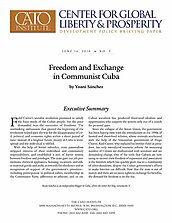Fidel Castro’s socialist revolution promised to satisfy the basic needs of the Cuban people, but the price demanded was the surrender of freedoms. The unthinking enthusiasm that greeted the beginning of the revolution helped pave the way for the disappearance of civil, political, and economic rights within a short period of time. Instead of a brighter future, misery in Cuba is widespread and the individual is vilified.
With the help of Soviet subsidies, state paternalism stripped citizens of their individual and community responsibilities, and established a sort of barter system between freedom and privileges. The state gave out job promotions, electrical appliances, housing, vacations, and other material goods and perks as rewards for obedience and in recognition of support of the government’s priorities — including participation in political rallies, membership in the Communist Party, adherence to atheism, and so on. Cuban socialism has produced frustrated idealists and opportunists who support the system only out of a search for personal gain.
Since the collapse of the Soviet Union, the government has been buying time with the introduction in the 1990s of limited and short-lived reforms, whose reversals accelerated with the help of the Venezuelan government of Hugo Chávez. Raúl Castro, who replaced his brother Fidel as president, has only introduced cosmetic reform. An increasing number of Cubans are disillusioned with socialism and are demanding change. One of the tools that Cubans are now using to recover their freedom of expression and association is the Internet, which has quickly given rise to a community of cyber-dissidents, despite the Cuban government’s efforts to make Internet use difficult. Now that the state is out of money and there are no more rights to exchange for benefits, the demand for freedom is on the rise.
About the Author

This work is licensed under a Creative Commons Attribution-NonCommercial-ShareAlike 4.0 International License.
